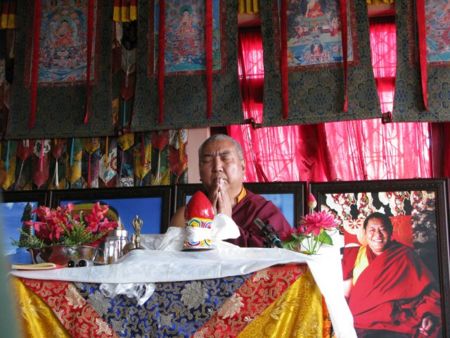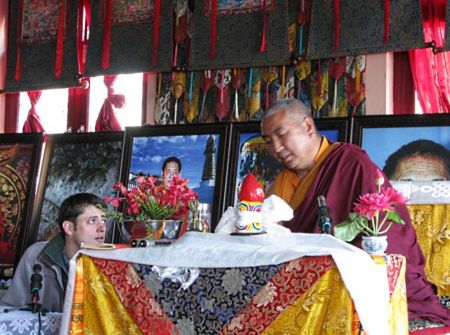Khenpo Namdrol 2008 Teachings on Buddha Nature: Difference between revisions
Jump to navigation
Jump to search
m (→Introduction) |
mNo edit summary |
||
| Line 31: | Line 31: | ||
The [[Uttaratantra Shastra]] says: | The [[Uttaratantra Shastra]] says: | ||
:Because the perfect buddhas’s [[kaya]] is all-pervading,<br>Because reality is undifferentiated,<br>And because they possess the potential,<br>Beings always have the buddha nature.<ref>''Sublime Continuum, I, 27''. Translation Adam Pearcey, ''Compendium of Quotations VI'', p. 49</ref> | :Because the perfect buddhas’s [[kaya]] is all-pervading,<br>Because reality is undifferentiated,<br>And because they possess the potential,<br>Beings always have the buddha nature.<ref>''Sublime Continuum, I, 27''. Translation Adam Pearcey, ''Compendium of Quotations VI'', p. 49</ref> | ||
====The Mistaken Apprehension of Others==== | |||
* ''4th teaching, 19-Dec-2008:'' A refutation of the position of early Tibetan commentators concerning the interpretation of the meaning of the Uttaratantra Shastra verse.<br>'''NOT online yet''' [http://www.rigpawiki.org/Media/Audio/2008-2009/20081219PH0930KN.mp3 20081219PH0930KN.mp3]<br>See Tibetan: Mipham ''gsung 'bum'', Vol 4., p. 567-569. English: Duckworth, p.149-151 | |||
==References== | ==References== | ||
Revision as of 08:45, 19 December 2008

Khenchen Namdrol Rinpoche is currently teaching the Rigpa Shedra on Mipham Rinpoche's work on buddha nature (Skt. sugatagarbha): The Lion's Roar: A Commentary on Sugatagarbha.
We will update this page on a daily basis with recordings of the teachings as we progress. The recordings contain the Tibetan teaching and its live English translation.
Recorded during Shedra East 2008-2009 in Pharping, Nepal

Study Material
Douglas Duckworth has recently published an English translation of the text we are studying:
- Douglas Duckworth, Mipam on Buddha-Nature. The Ground of the Nyingma Tradition, State University of New York Press, 2008. ISBN 978-0-7914-7521-8. The translation is contained in Appendix 1.
The Tibetan is contained in Mipham Rinpoche's collected works (gsung 'bum), Volume pod 4 pa
- bde gshegs snying po'i stong thun chen mo seng ge'i nga ro p. 563-608. See TBRC
The Lion's Roar: A Commentary on Sugatagarbha
By Jamgön Mipam Rinpoche
Prologue
- 1st teaching, 16-Dec-2008: How is buddha nature taught in sutra, tantra and Dzogchen?
online: 20081216PH0930KN.mp3
Introduction
- 2nd teaching, 17-Dec-2008: Our teacher the Buddha has taught on buddha nature emphazising sugatagarbha's essence (ngo bo) by teaching on emptiness. On other occasions, he gave clarifications on its nature (rang bzhin) by explaining its primordially present qualities. It is crucial to understand that those two aspects are in union.
online: 20081217PH0930KN.mp3
See Tibetan: Mipham gsung 'bum, Vol 4., p. 564-565. English: Duckworth, p.147-148
- 3rd teaching, 18-Dec-2008: Accuracy of scriptures can be examined by the three types of investigation and understanding establishes irreversible trust by means of the three types of valid cognition.[1] How can buddha nature (tathagatagarbha) be established in this way, as being empty in essence while cognizant in nature?
online: 20081218PH0930KN.mp3
See Tibetan: Mipham gsung 'bum, Vol 4., p. 566-567. English: Duckworth, p.148-149
A. Proof of the Presence of the Tathagatagarbha in all Sentient Beings
The Uttaratantra Shastra says:
- Because the perfect buddhas’s kaya is all-pervading,
Because reality is undifferentiated,
And because they possess the potential,
Beings always have the buddha nature.[2]
The Mistaken Apprehension of Others
- 4th teaching, 19-Dec-2008: A refutation of the position of early Tibetan commentators concerning the interpretation of the meaning of the Uttaratantra Shastra verse.
NOT online yet 20081219PH0930KN.mp3
See Tibetan: Mipham gsung 'bum, Vol 4., p. 567-569. English: Duckworth, p.149-151
References
- ↑ (tshad ma gsum) Another expression for the three types of investigation
- ↑ Sublime Continuum, I, 27. Translation Adam Pearcey, Compendium of Quotations VI, p. 49